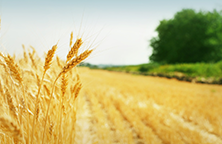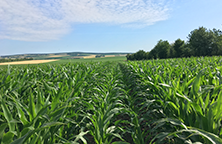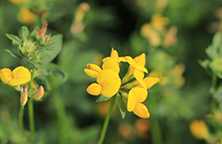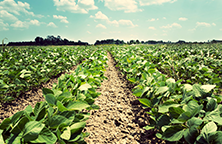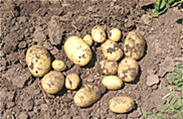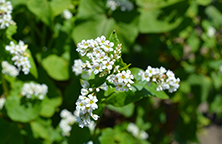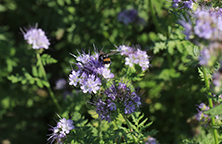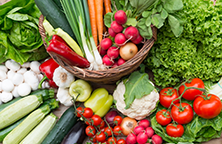Legal matters
According to Regulation (EU) 2018/848, the use of plant reproductive material, including seeds, produced in accordance with the conditions of organic farming is mandatory. In order to make the availability of plant reproductive material of certain species or varieties transparent, Regulation (EU) 2018/848 stipulates the establishment of an organic plant reproductive material database. In addition, this regulation also regulates the procedural requirements in the event of non-availability of the crop species to be cultivated or of varieties that do not correspond.
Principles of the organic plant reproductive material database (formerly organic seed database)
The principles of the database are as follows:
- The database is available to the public free of charge.
- Entries concerning seeds are made party-specifically with the required information in accordance with EU Regulation 2018/848 as part of the seed certification and authorisation procedure.
- Registrations of species that are subject to the EC seed regulations (Seed Act 1997 in Austria), but are not subject to the seed certification and authorisation procedure in Austria, are made upon request (informally by email to biopvmaterialdatenbank@ages.at).
- Entries of species that are not subject to the EC seed regulations (Seed Act 1997 in Austria) are made by informal notification by e-mail to biopvmaterialdatenbank@ages.at (all botanical species, without restriction to the species list according to the Seed Ordinance).
- Any other plant propagation material such as cuttings/seedlings of fruit, vines, vegetable seedlings, ornamental seedlings and mushrooms can be registered using the form for the organic plant propagation material database
The requirements for registration in the database:
- Conformity of production in accordance with EU Regulation 2018/848 is required for plant reproductive material.
- In the case of seed, proof must be provided (automatically for seed and planting material certified or authorised in Austria) that the seed complies with the requirements of this law and thus with the relevant conditions for placing on the market under EC law, provided that the species is subject to the Seed Act 1997.
- Conversion plant propagating material can also be included in the database and is labelled as such
Organic seed that is pending at the Federal Office for Food Safety as part of the certification and authorisation procedure (e.g. seed certification) is transferred directly to the database after the procedure has been successfully completed. If this is not desired by the applicant, this must be communicated in writing.
In the course of the seed certification procedure in cooperation with the organic inspection bodies, the demonstrable verification of seed production in accordance with EU Regulation 2018/848 is carried out on the basis of a certificate from an authorised organic inspection body. Conformity with EU Regulation 2018/848 for the seed lot in question is stated on the certificate of recognition or authorisation (notification) of seed. This also allows labelling as "organic seed" and with the code of the organic inspection body on the official label.
Procedure and information:
a) A written confirmation of the conformity of production in accordance with EU Regulation 2018/848 ("organic certificate") from the respective competent organic inspection body is required from each propagator from whom seed is presented for seed quality testing in a certification or authorisation procedure.
b) A valid certificate ("organic certificate") must be submitted to the Federal Office for Food Safety at the beginning of the season, at least with the first sample for seed certification in the "new" season, for each seed processing station within the meaning of §9 of the Seed Act 1997.
Special regulation: in the case of a larger number of organic propagations per applicant, a simplified procedure using EDP is offered. Details can be requested from the BAES
Organic seed of species that are subject to seed law but are brought from the EC area and are not subject to a procedure at the Federal Office, or organic seed from suppliers (traders) who are not responsible for the processing and certification of the goods, can be applied for registration by the seed supplier using a form.
The notification for such seed is made informally by e-mail (biopvmaterialdatenbank@ages.at) to the AGES - Institute for Seed and Seedlings, Plant Protection Service and Bees.
The following data must be sent to us for entry in the DB:
- Contact details of the applicant
- Crop type
- Variety (the variety MUST be listed in the EU variety catalogue or another national variety catalogue, proof must be provided in case of doubt)
- Date from when the batch is available
- Organic inspection body code of the goods responsible for the producer
- Quantity of the available goods in kg
- Control number or unique batch designation
- Status of the plant reproductive material (organic plant reproductive material or in-conversion plant reproductive material)
- For entry in the plant reproductive material database, valid proof of organic status must be provided for each batch.
- The following are valid proofs: an official label of the lot (original or photo) with the printed organic inspection centre code or a photo of the official label and the additional organic label, which shows that both labels are attached to the same bag.
- Furthermore, a valid organic certificate from the seed processor must be provided.
Organic seed of species that are not subject to seed law can also be registered.
The application for entry in the organic plant reproductive material database is also made informally by email (biopvmaterialdatenbank@ages.at). In any case, proof of conformity of production with EU Regulation 2018/848 must be submitted (organic certificate of the producer). If such crops are to be registered, the data must be transmitted to us as explained in point 2.
Plant propagation material
With the validity of EU Regulation 2018/848, it is also possible to register any other organic plant reproductive material in the database in addition to seeds.
The application for registration in the organic plant reproductive material database is made by means of a completed form.
Please send the completed form to biopvmaterialdatenbank@ages.at so your application can be uploaded to the organic plant reproductive material database.
The registration of plant propagating material of fruits, vines, vegetables, ornamental plants and mushrooms is voluntary and free of charge. Changes regarding the availability of plant propagation material must be communicated to us promptly by the supplier.
Discharge from the organic plant propagation material database
- EU Regulation 2018/848 expressly stipulates that changes in the availability of a supplier's variety must be reported immediately to the database manager (AGES GmbH - Institute for Seed and Seedlings, Plant Protection Service and Bees). We ask you to pay particular attention to this point and to set up a corresponding flow of information so that no follow-up costs arise from a lack of up-to-date information.
- Notifications about the non-availability and a corresponding removal of varieties from the organic plant propagation material database can be reported informally by e-mail (biopvmaterialdatenbank@ages.at).
Content and info
The Federal Office for Food Safety (BAES) is the competent authority for the certification and authorisation of seeds and seedlings.
The certification of seed from and for organic farming requires special process control during the entire certification procedure. Not only is conformity with the relevant legal bases regarding the certification of seed checked, insofar as there are legal provisions on seed for the respective crop type, but also the fulfilment of the requirements for propagation areas, seed lots and processing stations within the meaning of EU Regulation 2018/848. This ensures the publication of all seed lots approved for organic farming in this organic plant propagation material database, as well as labelling on the official seed label.
Only those lots are listed in the database that have final positive recognition or authorisation and are intended for the final consumer, i.e. no propagating material (breeder, pre-basic and basic seed) is recorded.
The following data fields are specified in the database, which are also briefly explained below:
| Variety | Name of the variety with which it is listed in the respective list of varieties (Austrian or EU list of varieties). |
|---|---|
| Variety registration | Indicates the country (countries) in which the variety is listed. "AUSTRIA" stands for registration in the Austrian List of Varieties, which means that the variety has also been tested in Austria (see descriptive Austrian List of Varieties). "EU" indicates varieties that are only listed in the EU variety catalogue but have NOT been officially tested in Austria. |
| Applicant | The company/person who applies for certification of the seed lot and places the seed on the market, at least for the first time. The applicant is often not the final seller. |
| Category | Z/Z1 seed: Certified seed or 1st generation certified seed (= equivalent) - Label colour: BLUE |
| Control number of the lot | This number is used to uniquely identify the seed lot. This allows the origin and the link to the certificate of certification to be traced. This identity number is essential for any complaints. Note: Keep official seed labels = guarantee card for this purpose until harvest. |
Status | The status indicates whether it is organic plant propagating material ("organic"), in-conversion plant propagating material ("in-conversion") or a fodder plant seed mixture consisting of at least 70% organic components ("at least 70% organic"). |
| Organic inspection body code | is the code of the organic inspection body or inspection authority responsible for the conformity of the final processor (processor) of the seed in accordance with EU Regulation 2018/848. |
| Quantity | The weight listed in the database is that which was present at the time of certification. In special cases, lot weights and lots already listed can be changed or even cancelled (e.g. withdrawals, category reclassifications, official cancellation of certification, etc.). In special cases (e.g. for vegetable seed), the lot weights may also be omitted. |
| Unit | Kilogram, piece |
| Available from | is the date from which the procedure at the Federal Office for Food Safety was successfully completed. The database entry is made automatically immediately after the decision is issued or the date reported to the Federal Office for Food Safety by the seed supplier as the availability date, provided that this seed is not subject to a certification or authorisation procedure at the Federal Office. |
| Available until | This field provides information as to whether or until when the variety is still available from the respective applicant for seed certification or distributor based on their notification, or until when it was available. However, it is possible that this variety is still available from another applicant or distributor. No date in this field means that the variety is still available. |
| Contact details | Company - Street/house number - Postcode/city - Telephone number - E-mail - Web |
Organic seed multiplication plots
Seed lots cannot be included in the organic plant propagation material database until the certification procedure has been positively completed, i.e. the specified seed quality criteria have been demonstrably met. Only then may the seed be sold to the end user, the farmer. In order to provide a comprehensive overview of those varieties that were propagated in organic farming in the respective certification season, the varieties of all crop types propagated in organic farming in Austria are available.
It should be noted, however, that varieties are only actually available subject to a positive seed certification. Furthermore, the organic seed database may also contain seed of varieties that do not appear in the field certification areas, for example in the case of foreign propagations or overstocked seed.
Click here for the current organic seed multiplication areas.
Contact us
Ing Ernestine Lippert
- biopvmaterialdatenbank@ages.at
- +43 50555 34813
-
Spargelfeldstraße 191
1220 Wien
Miriam Lechner
- biopvmaterialdatenbank@ages.at
- +43 50555 34815
-
Spargelfeldstraße 191
1220 Wien
Last updated: 11.07.2024
automatically translated
